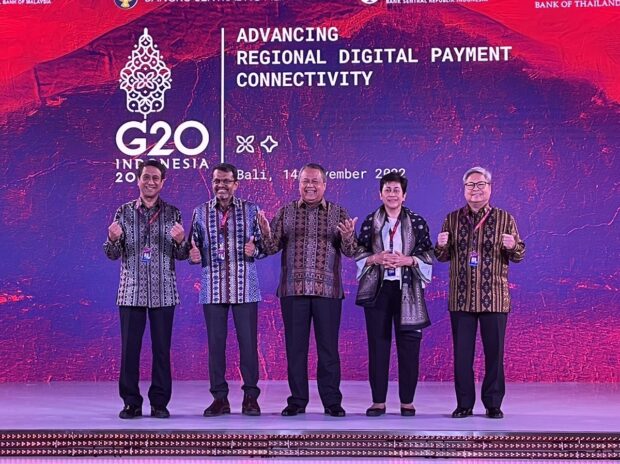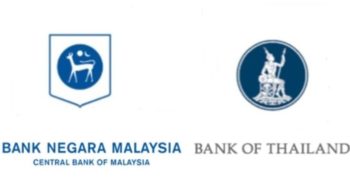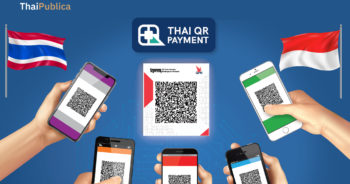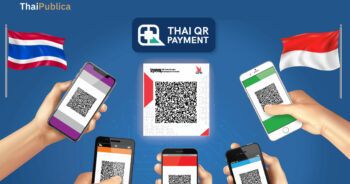ธนาคารกลางอินโดนีเซีย มาเลเซีย ฟิลิปปินส์ สิงคโปร์ และไทยร่วมลงนามบันทึกความเข้าใจ (MOU) ว่าด้วยความร่วมมือด้านการเชื่อมโยงระบบการชำระเงินในภูมิภาค
ธนาคารกลางอินโดนีเซีย (Bank Indonesia) ธนาคารกลางมาเลเซีย (Bank Negara Malaysia) ธนาคารกลางสิงคโปร์ (Monetary Authority of Singapore) ธนาคารกลางฟิลิปปินส์(Bangko Sentral ng Pilipinas) และธนาคารแห่งประเทศไทย (ธปท.) ได้ตกลงที่จะเสริมสร้างและยกระดับความร่วมมือด้านการเชื่อมโยงระบบการชำระเงินเพื่อสนับสนุนให้การชำระเงินข้ามพรมแดนทำได้เร็วขึ้น ในต้นทุนที่ต่ำลง โปร่งใสขึ้น และทั่วถึงมากขึ้น
บันทึกความเข้าใจ (MOU) ว่าด้วยความร่วมมือในการเชื่อมโยงการชำระเงินในภูมิภาค (Regional Payment Connectivity) มีการลงนามเมื่อวันที่ 14 พฤศจิกายน 2565 ที่บาหลี ประเทศอินโดนีเซีย นอกรอบการประชุมสุดยอดผู้นำ G20 โดยประธานาธิบดีโจโก วิโดโด แห่งอินโดนีเซียกล่าวสุนทรพจน์
ประธานาธิบดีวิโดโดกล่าวสุนทรพจน์ในพิธีลงนาม โดยเน้นย้ำถึงความสำคัญของการดำเนินการร่วมกันที่เป็นรูปธรรมในการจัดการกับความท้าทายระดับโลก และได้ขอบคุณผู้ว่าการธนาคารกลางทั้ง 5 แห่งสำหรับความมุ่งมั่นในการนำเสนอนวัตกรรมที่ก้าวหน้า ซึ่งจะช่วยเร่งการเชื่อมโยงการชำระเงินในภูมิภาค
การเชื่อมโยงการชำระเงินในภูมิภาค จะมีส่วนสำคัญในการเร่งการฟื้นตัวของเศรษฐกิจในภูมิภาคและส่งเสริมการเติบโตอย่างทั่วถึง การดำเนินการเชื่อมโยงการชำระเงินข้ามพรมแดนจะสนับสนุนและอำนวยความสะดวกในการค้าข้ามพรมแดน การลงทุน การเงินเชิงลึก การส่งเงินกลับ การท่องเที่ยว และกิจกรรมทางเศรษฐกิจอื่น ๆ ตลอดจนระบบนิเวศทางการเงินที่ครอบคลุมมากขึ้นในภูมิภาค ซึ่งเป็นประโยชน์อย่างมากสำหรับธุรกิจขนาดย่อม ขนาดเล็ก และขนาดกลาง เนื่องจากจะช่วยอำนวยความสะดวกในการเข้าร่วมในตลาดต่างประเทศ ความร่วมมือดังกล่าวจะมีรูปแบบหลากหลาย ทั้งผ่านคิวอาร์โค้ดและการชำระเงินที่รวดเร็ว
การเร่งเปลี่ยนผ่านเศรษฐกิจและการเงินให้ก้าวสู่ดิจิทัลได้กลายเป็นความคิดริเริ่มระดับโลก โดย G20 ได้กำหนดแผนงานเพื่อยกระดับการชำระเงินข้ามพรมแดน ความคิดริเริ่มในความร่วมมือยังสอดคล้องกับวาระสำคัญด้านการขับเคลื่่อนไปสู่ดิจิทัลของอินโดนีเซียในฐานะประธาน G20 ซึ่งรวมถึงผ่านระบบการชำระเงินในยุคดิจิทัล ซึ่งเห็นได้จากความพยายามร่วมกันในการดำเนินการยกระดับการเชื่อมโยงการชำระเงินข้ามพรมแดนที่มีอินโดนีเซีย มาเลเซีย ฟิลิปปินส์ และสิงคโปร์ และประเทศไทยเข้าร่วม
มองไปข้างหน้า โครงการริเริ่มด้านการเชื่อมโยงการชำระเงินนี้สามารถขยายให้ครอบคลุมประเทศอื่นๆ ในภูมิภาคและประเทศพันธมิตรอื่นๆ ที่อาจเป็นไปได้นอกภูมิภาค เหตุการณ์สำคัญนี้ยังเป็นจุดเริ่มต้นของการเป็นประธานสมาคมประชาชาติแห่งเอเชียตะวันออกเฉียงใต้ (อาเซียน) ของอินโดนีเซียในปี 2566
ความร่วมมือร่วมนี้ยังสนับสนุนเป้าหมายร่วมกันของอาเซียนที่จะมีระบบการชำระเงินที่เชื่อมโยงกัน ซึ่งจะช่วยให้สามารถชำระเงินข้ามพรมแดนได้อย่างรวดเร็ว ไร้รอยต่อ และมีราคาจับต้องได้ทั่วทั้งภูมิภาค เพื่อให้สอดคล้องกับแนวทางปฏิบัติของอาเซียนในการบูรณาการให้ลึกขึ้นผ่านข้อตกลงที่เป็นประโยชน์ร่วมกันโดยพิจารณาจากระดับความพร้อม การริเริ่มนี้เป็นการสร้างพื้นฐานสำหรับการมีส่วนร่วมของอาเซียนในวงกว้างในอนาคตอันใกล้ ซึ่งจะเป็นการเสริมสร้างความสัมพันธ์ทางเศรษฐกิจในระดับภูมิภาคที่เข้มแข็ง
นายเพอร์รี วาร์จิโย ผู้ว่าการธนาคารกลางอินโดนีเซียย้ำว่า “MOU ฉบับนี้ถือเป็นหลักชัยสำคัญในการปูทางไปสู่การพัฒนาการเชื่อมโยงการชำระเงินข้ามพรมแดน ข้อตกลงการเชื่อมต่อการชำระเงินทวิภาคีที่มีอยู่จะถูกขยายให้เป็นส่วนหนึ่งของความพยายามของภูมิภาคในการเสริมสร้างการบูรณาการทางเศรษฐกิจ ความร่วมมือระหว่างธนาคารกลางดังกล่าวเป็นปัจจัยสำคัญในการเร่งการฟื้นตัวของเศรษฐกิจ เราหวังว่าประเทศอื่นๆ จะดำเนินการตามตัวอย่างที่ดีและความเป็นผู้นำในการใช้การเชื่อมโยงการชำระเงินข้ามพรมแดน”
นูร์ ชัมเซียะห์ ยูนุส ผู้ว่าการธนาคารกลางมาเลเซียกล่าวว่า “ความคิดริเริ่มนี้ย้ำถึงความสำคัญของการทำงานร่วมกันของธนาคารกลางในการสนับสนุนการพัฒนาการเชื่อมโยงการชำระเงินยุคหน้า การทำให้วิสัยทัศน์ของเครือข่ายระบบการชำระเงินข้ามพรมแดนที่รวดเร็วและมีประสิทธิภาพระดับภูมิภาคของอาเซียนเป็นจริง จะช่วยพัฒนาเป้าหมายทางดิจิทัลของเราและส่งเสริมการบูรณาการทางการเงินที่ลึกยิ่งขึ้นเพื่อประโยชน์ของการพัฒนาเศรษฐกิจของภูมิภาค”
นายราวี เมนอน กรรมการผู้จัดการของ MAS กล่าวว่า “MOU ฉบับนี้เน้นย้ำถึงความมุ่งมั่นของอาเซียนในการบรรลุเป้าหมายที่จะทำให้การชำระเงินในภูมิภาคสามารถเชื่อมโยงกันได้ และมีการเชื่อมโยงภาบในปี 2568 ซึ่งส่งผลให้การชำระเงินข้ามแดนมีราคาถูกลง เร็วขึ้น และโปร่งใสมากขึ้น ความพยายามของอาเซียนสอดคล้องกับเป้าหมายของ G20 ในการจัดการกับข้อจำกัดของการชำระเงินข้ามพรมแดนทั่วโลก สร้างโอกาสทางธุรกิจใหม่ ๆ และส่งเสริมการเติบโตอย่างทั่วถึง”
นายมาริโต ทังโกนาน รองผู้ว่าการ ธนาคารกลางฟิลิปปินส์ซึ่งเป็นตัวแทนของ เฟลิเป เมดาลลา ผู้ว่าการ กล่าวว่า “ยิ่งเราตระหนักว่าเศรษฐกิจของเราพึ่งพาซึ่งกันและกันมากเพียงใด เรายิ่งต้องพิจารณาอย่างรอบคอบในการเดินหน้าตามวิสัยทัศน์ของภูมิภาคอาเซียนที่เชื่อมโยงกัน บันทึกความเข้าใจนี้เน้นย้ำถึงแนวทางการทำงานร่วมกันและครอบคลุมของเราในการยกระดับการชำระเงินข้ามแดนในอาเซียน ซึ่งจะนำไปสู่การเพิ่มประสิทธิภาพและการประหยัดต้นทุนในการทำธุรกรรมทางการเงินระหว่างประเทศและกิจกรรมทางเศรษฐกิจต่างๆ”
นายรณดล นุ่มนนท์ รองผู้ว่าการ ด้านเสถียรภาพระบบสถาบันการเงิน ธปท. ซึ่งเข้าร่วมงานแทนดร.เศรษฐพุฒิ สุทธิวาทนฤพุฒ ผู้ว่าการ ธปท. กล่าวว่า “ปัจจุบันอาเซียนเป็นภูมิภาคที่ได้รับความสนใจอย่างมากจากนานาประเทศในด้านการเชื่อมโยงระบบการชำระเงิน โดย MOU นี้เป็นการต่อยอดจากสิ่งที่ประเทศสมาชิกได้เริ่มดำเนินการไปแล้วในช่วงที่ผ่านมา และเป็นอีกก้าวสำคัญในการร่วมกันก้าวข้ามอุปสรรคด้านการชำระเงินระหว่างประเทศที่มีมายาวนาน ทั้งนี้ MOU ดังกล่าวสอดคล้องกับการเชื่อมโยงระบบการชำระเงินในปัจจุบันของอาเซียนซึ่งเป็นการเชื่อมแบบทวิภาคี และจะเป็นจุดเริ่มต้นสำหรับการเชื่อมแบบพหุภาคี เพื่อสนับสนุนการขับเคลื่อนทางดิจิทัล และการรวมกลุ่มทางการเงินในภูมิภาคต่อไป”
…………………
CENTRAL BANKS OF INDONESIA, MALAYSIA, PHILIPPINES, SINGAPORE, AND THAILAND SEAL COOPERATION IN REGIONAL PAYMENT CONNECTIVITY
Bank Indonesia (BI), Bank Negara Malaysia (BNM), Bangko Sentral ng Pilipinas (BSP), Monetary Authority of Singapore (MAS), and Bank of Thailand (BOT) have agreed to strengthen and enhance cooperation on payment connectivity to support faster, cheaper, more transparent, and more inclusive cross-border payments. A Memorandum of Understanding (MOU) on Cooperation in Regional Payment Connectivity (RPC) was signed on 14 November 2022 in Bali, Indonesia, on the sidelines of the G20 Leaders’ Summit with keynote address from Indonesia’s President, His Excellency Joko Widodo.
During his remarks at the signing ceremony, President Widodo emphasized the importance of concrete joint collaborative action in addressing global challenges. The President also expressed his highest appreciation to the Governors of the five central banks for their commitment to delivering innovative breakthroughs that will further accelerate regional payment connectivity.
The RPC is expected to be a significant contributor to accelerating regional economic recovery and promoting inclusive growth. The implementation of cross-border payment connectivity serves to support and facilitate cross-border trade, investment, financial deepening, remittance, tourism, and other economic activities, as well as a more inclusive financial ecosystem in the region. This is particularly beneficial for micro, small, and medium enterprises as it will facilitate their participation in international markets. The cooperation will include a number of modalities, including QR code and fast payment.
Accelerating economic and financial digitalization has become a global initiative with the G20 establishing its Roadmap for Enhancing Cross Border Payments. The cooperation initiative is also in line with Indonesia’s G20 Presidency priority agenda in the area of digital transformation, including through payment systems in the digital era, manifested by the joint efforts to pursue enhanced cross-border payment connectivity involving Indonesia, Malaysia, Philippines, Singapore, and Thailand. Going forward, this payment connectivity initiative could be expanded to include other countries in the region and potentially other partner countries outside the region. This milestone also marks the start of Indonesia’s chairmanship of the Association of Southeast Asian Nations (ASEAN) in 2023.
This joint collaboration also supports ASEAN’s shared aspiration for connected payment systems that will enable fast, seamless and more affordable cross-border payments across the region. In line with ASEAN’s pragmatic approach to deepen integration through mutually beneficial arrangements based on the level of readiness, this initiative provides the building blocks for wider ASEAN participation in the near future, thereby fostering stronger regional economic ties.
BI Governor Perry Warjiyo underscored that “This MOU serves as a significant milestone in paving the road for advancing cross-border payment connectivity. Existing bilateral payment connectivity arrangements will be expanded as part of the region’s efforts to strengthen its economic integration. Such collaboration among central banks is key to accelerating economic recovery. We hope that other countries will follow this good example and leadership in implementing cross-border payment connectivity.”
Nor Shamsiah Yunus, the Governor of BNM, said, “The initiative underscores the importance of central bank collaboration in supporting the development of next-generation payment connectivity. Realising the vision of an ASEAN regional network of fast and efficient cross-border payment systems will advance our digital ambitions and further deepen financial integration for the benefit of the region’s economic development.”
Ravi Menon, Managing Director of MAS, stated, “This MOU underscores ASEAN’s commitment to achieve regional payments interoperability and connectivity by 2025 to enable cheaper, faster, and more transparent cross-border payments. ASEAN’s effort is aligned with the G20’s goal of addressing existing frictions in global cross-border payments, creating new business opportunities and enabling inclusive growth.”
Deputy Governor Mamerto E. Tangonan of the BSP, who represented BSP Governor Felipe M. Medalla, added, “The more we recognize how interdependent our economies are, the more we need to be deliberate in our pursuit of the vision of an interconnected ASEAN region. This MOU concretizes our collaborative and inclusive approach to enhancing cross-border payments in the ASEAN that will translate into efficiency gains and cost savings in various international financial transactions and economic activities.”
Deputy Governor Ronadol Numnonda of the BOT, who represented BOT Governor Sethaput Suthiwartnarueput, emphasized, “Our ASEAN region has now become a global hotspot in cross-border payments linkages. Building on our previous efforts, this MOU marks another milestone in our ASEAN Payment Connectivity initiative in working together to address the long-standing pain points in cross-border payments. It also dovetails ASEAN members’ current network of bilateral cross-border payment linkages and will serve as a basis for multilateral collaboration going forward. Further enhancing regional payment connectivity will pave the way for ASEAN’s digital transformation and deepen financial integration in the region.”





